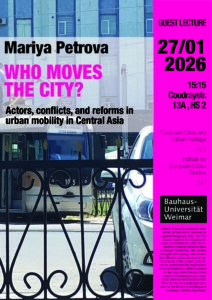
Upcoming lecture: “Who Moves the City? Actors, Conflicts, and Reforms in Urban Mobility in Central Asia”
Guest lecture by Mariya Petrova at Bauhaus Universität Weimar
27.01.2026
15:15; Coudraystr. 13A, HS2
Institute for European Urban Studies, Bauhaus Universität Weimar
Rapid urbanisation and population growth, decades of neglected public transport and an increasing number of cars make urban mobility to a daily struggle for many citizens and pose major challenges for the cities in todays central Asia. Since the dissolution of the soviet Union the condition of urban mobility infrastructures in the region followed common patterns: from disinvestment, privatisation and informalisation in the 90-s, car-oriented development in 2000s to recent modernisation efforts, intensively supported by international developmental credits and fuelled by global imaginaries of urban modernity.

Out now: Automated Public Transport in Germany
A new map dossier on Automated public transport in Germany by Wladimir Sgibnev, Karol Kurnicki and Stella Marie Köhler has been published on Nationalatlas Aktuell.
The use of automated buses in local public transport (ÖPNV) continues to gain momentum in Germany. Between 2016 and 2024, 85 projects were launched nationwide, as shown by interactive maps on Nationalatlas Aktuell. The article explores the associated data, spatial distribution patterns of projects, actor dynamics and funding structures in the new field. A supplementary glossary provides additional background information on the development of automated/autonomous driving in Germany.
Cite:
Köhler, Stella Marie / Kurnicki, Karol / Wladimir Sgibnev (2025): Automatisierter ÖPNV in Deutschland. In: Nationalatlas aktuell 19 (10.2025) 5 [10.10.2025]. Leipzig: Leibniz-Institut für Länderkunde (IfL).
Publication alert
Almost a year after his personal meeting with the editor of Transfers, Egor’s article was published in the journal. Unfortunately, it is behind a paywall, but you can definitely reach out to the author and request a PDF. The paper focuses on the search for the source of epistemic superiority and engages with recent debates around the concept of technocracy. It draws on theoretical insights from Thorstein Veblen’s oeuvre and findings from anarchist thinkers. The reintroduction of a trolleybus service in Prague is offered as an empirical illustration. The paper’s central argument is that the procedures of knowledge production are the main source of epistemic superiority. This shifts the focus from an analytical value in itself to the executive mechanisms that enable a specific type of expertise.
(more…)